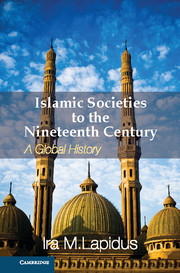Book contents
- Frontmatter
- Contents
- List of Illustrations
- List of Figures
- List of Maps
- List of Tables
- Preface
- Acknowledgments
- Acknowledgments to the first edition of A History of Islamic Societies
- Acknowledgments to the second edition of A History of Islamic Societies
- Publisher's Preface
- Introduction to Islamic Societies
- Part I The Beginnings of Islamic Civilizations
- The Middle East from c. 600 TO c. 1000
- The Preaching of Islam
- The Arab-Muslim Imperium (632–945)
- Cosmopolitan Islam: The Islam of The Imperial Elite
- Chapter 11 Introduction: Religion and Identity
- Chapter 12 The Ideology of Imperial Islam
- Chapter 13 The ʿAbbasids: Caliphs and Emperors
- Urban Islam: The Islam of Scholars and Holy Men
- Women, Families, and Communities
- Part II From Islamic Community to Islamic Society
- Part III The Global Expansion of Islam from the Seventh to the Nineteenth Centuries
- Glossary
- Bibliography
- Annotated Bibliography from A History of Islamic Societies, 2nd Edition
- Index
Chapter 13 - The ʿAbbasids: Caliphs and Emperors
Published online by Cambridge University Press: 05 February 2013
- Frontmatter
- Contents
- List of Illustrations
- List of Figures
- List of Maps
- List of Tables
- Preface
- Acknowledgments
- Acknowledgments to the first edition of A History of Islamic Societies
- Acknowledgments to the second edition of A History of Islamic Societies
- Publisher's Preface
- Introduction to Islamic Societies
- Part I The Beginnings of Islamic Civilizations
- The Middle East from c. 600 TO c. 1000
- The Preaching of Islam
- The Arab-Muslim Imperium (632–945)
- Cosmopolitan Islam: The Islam of The Imperial Elite
- Chapter 11 Introduction: Religion and Identity
- Chapter 12 The Ideology of Imperial Islam
- Chapter 13 The ʿAbbasids: Caliphs and Emperors
- Urban Islam: The Islam of Scholars and Holy Men
- Women, Families, and Communities
- Part II From Islamic Community to Islamic Society
- Part III The Global Expansion of Islam from the Seventh to the Nineteenth Centuries
- Glossary
- Bibliography
- Annotated Bibliography from A History of Islamic Societies, 2nd Edition
- Index
Summary
The Caliphate and Islam
Like the Umayyads, the ʿAbbasids pursued two kinds of legitimation, Islamic and imperial. From the beginning, the caliphs were involved in religious matters, but their engagement was limited. The Rashidun caliphs – as companions of the Prophet – left authoritative precedents in many matters of law. ʿUthman promulgated an official edition of the Quran. Muʿawiya tried to exert influence over communal-religious leaders by appointing Quran readers and judges. Caliphs built mosques, protected the pilgrimage, proffered justice to the people, and waged war on behalf of the Islamic empire. In the reigns of ʿAbd al-Malik and his successors, the construction of great mosques defined the caliphs as patrons of Islam who glorified their religion and made it prevail over Byzantine Christianity. The Caliph ʿUmar II came to the throne from an earlier career in Medina engaged in legal and religious activity and brought to the caliphate a renewed concern for communal-religious issues. The later Umayyads assumed the right to intervene in theological matters; they executed Qadari theologians who proclaimed God's power absolute and, by implication, subordinated the authority of the caliphs. Their court poets bestowed on them the grandiose title of God's deputy (khalifat Allah).
The ʿAbbasids reaffirmed the Islamic basis of their legitimacy. In the course of their anti-Umayyad revolution, the early ʿAbbasids tried to promote their claim to rule as Hashimites; being the family of the Prophet, this revered lineage stood above all ethnic, tribal, regional, and local interests. They also maintained that the right to rule was assigned to the founder of their lineage, Ibn al-ʿAbbas, by the Prophet himself. As caliphs, they inherited the attributes of religious authority: the Prophet's cloak, stave, and ring. The royal name was inscribed on coins and the borders of ceremonial garments (tiraz) and was invoked in the Friday sermon (khutba). They themselves claimed to be appointed by God to follow in the ways of the Prophet and to lead the Muslim community along the path of Islam. The idea of God's caliph was invoked in ʿAbbasid as well as in Umayyad poetry.
- Type
- Chapter
- Information
- Islamic Societies to the Nineteenth CenturyA Global History, pp. 126 - 140Publisher: Cambridge University PressPrint publication year: 2012



